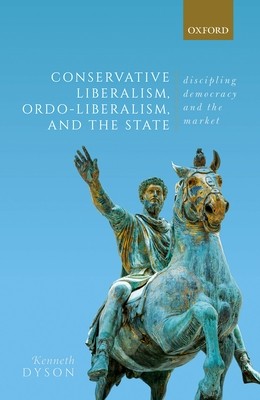
- We will send in 10–14 business days.
- Author: Kenneth Dyson
- Publisher: Oxford University Press, USA
- ISBN-10: 0198854285
- ISBN-13: 9780198854289
- Format: 16.3 x 23.6 x 4.1 cm, hardcover
- Language: English
- SAVE -10% with code: EXTRA
Conservative Liberalism, Ordo-Liberalism, and the State (e-book) (used book) | bookbook.eu
Reviews
Description
This book uses extensive original archival and elite interview research to examine the attempt to rejuvenate liberalism as a means of disciplining democracy and the market through a new rule-based economic and political order. This rebirth took the form of conservative liberalism and, in its most developed form, Ordo-liberalism. It occurred against the historical background of the great transformational crisis of liberalism in the first part of the twentieth century. Conservative liberalism evolved as a cross-national phenomenon. It included such eminent and cultured liberal economists as James Buchanan, Frank Knight, Henry Simons, Ralph Hawtrey, Jacques Rueff, Luigi Einaudi, Walter Eucken, Friedrich Hayek, Alfred Müller-Armack, Wilhelm Röpke, Alexander Rüstow, and Paul van Zeeland, as well as leading lawyers like Louis Brandeis, Franz Böhm, and Maurice Hauriou. Conservative liberals also played a formative role in establishing new international networks, notably the Mont Pèlerin
Society.
EXTRA 10 % discount with code: EXTRA
The promotion ends in 20d.11:27:24
The discount code is valid when purchasing from 10 €. Discounts do not stack.
- Author: Kenneth Dyson
- Publisher: Oxford University Press, USA
- ISBN-10: 0198854285
- ISBN-13: 9780198854289
- Format: 16.3 x 23.6 x 4.1 cm, hardcover
- Language: English English
This book uses extensive original archival and elite interview research to examine the attempt to rejuvenate liberalism as a means of disciplining democracy and the market through a new rule-based economic and political order. This rebirth took the form of conservative liberalism and, in its most developed form, Ordo-liberalism. It occurred against the historical background of the great transformational crisis of liberalism in the first part of the twentieth century. Conservative liberalism evolved as a cross-national phenomenon. It included such eminent and cultured liberal economists as James Buchanan, Frank Knight, Henry Simons, Ralph Hawtrey, Jacques Rueff, Luigi Einaudi, Walter Eucken, Friedrich Hayek, Alfred Müller-Armack, Wilhelm Röpke, Alexander Rüstow, and Paul van Zeeland, as well as leading lawyers like Louis Brandeis, Franz Böhm, and Maurice Hauriou. Conservative liberals also played a formative role in establishing new international networks, notably the Mont Pèlerin
Society.


Reviews